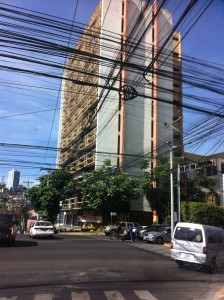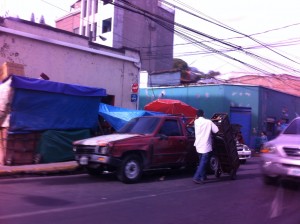Back in April, when I received the letter confirming I would be one of the Peacebuilders Fellows in Honduras I was so excited about the adventures awaiting in Honduras. So much crossed my mind. I would finally get to know more about Central America, a region quite close to Brazil, but for some reason not studied much in my home country.
And then the date came to pack everything in my room at a student residence in Geneva and fly to Brazil, but with a long connection in London. After many hours traveling, I was finally home, meeting my family and friends and eating the food I’ve missed so much. Just two days later it was time to fly again, now to a country I’ve never been, Colombia. I got there on a Sunday evening and was impressed with all the super cute dogs at the airport, searching for drugs. I went straight to a hotel near the airport, as the next day I would fly to el Salvador and from there to Honduras. Unfortunately, I couldn’t see much of Bogota, but the hours waiting at the airport – a big and modern one, way better organized than many airports in brazil – made me realize that everyone was quite used to the dogs and armed guards walking around.
The flight to El Salvador was not that long, but still they served a proper lunch and drinks, which nowadays you have to pay for if you’re traveling with a Brazilian company in a “short” trip like that. My flight to Honduras would leave 30 minutes after I landed in Salvador, so I was quite worried of missing the flight. But, surprise surprise, not only was the Salvadorian airport small, but my next gate was just in front the one I arrived. Waiting for the departure, I finally met Christine, the other fellow, in person. We chatted for awhile and got on the plane that would take us to our new and short peacebuilders’ life.
Time to land in Honduras. One afraid of flying should think twice before traveling to the airport in Tegucigalpa. The airstrip is so short, that the pilot has to brake super fast, a little bit of adrenaline to start my Honduran experience. After all these connections, passing through 5 countries before arriving in Honduras, at the immigration, I came to realize some misconceptions I had about the country. As much of the information I read before coming always highlighted the negative aspects of the country – violence, corruption, poverty – I was expecting a disorganized immigration process. But what I came across was a modern and well prepared system.
At the arrival, one of the staff of CRS was already waiting for us. The best first impression one can have of Honduran hospitality! We spent our first two nights in Tegucigalpa. Many things impressed me. For instance, the traffic was crazy! Even though I have had a drivers license for 8 years, I definitely would not be brave enough to drive in Tegus, as residents call it. The cars also kept my attention, the inequality is visible, most cars were either fancy SUV or really old cars. The disparity would also be in the houses, most of the houses near our hotel were big and well preserved, but on our way to the historical centre, we passed through a lot of poor houses, most of them on the hill. Another thing that impressed me is how in many stores, even the ones selling mattress, there would be a armed guard. Coming from a country permeated with urban violence, I thought I would feel a little bit like “home”, but the amount of armed guards was a constant reminder of how unsafe Tegucigalpa can be. Having said that, is important to highlight that I didn’t see any violent activity while I was there.
Moreover, for some reason, the electricity cables really kept my attention. Being born and raised in a planned city, Brasilia, where the vast majority of the electric cables are underground, seeing such a chaotic system, with cables all over, impressed me. I started to wonder if the water system would be better organized and got even more excited to learn about the water management and the water conflict in Honduras. Topic for another post.



